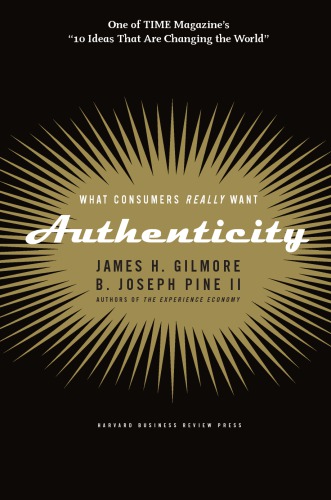
Authenticity
What Consumers Really Want
کتاب های مرتبط
- اطلاعات
- نقد و بررسی
- دیدگاه کاربران
نقد و بررسی

September 10, 2007
This eye-opening but muddled volume tells companies to “remain true to self” or, at least, to appear genuine, arguing that “in a world increasingly filled with deliberately and sensationally staged experiences... consumers choose to buy or not buy based on how real they perceive an offering to be.” Everything that forms a company's identity—from its name and practices to its product details—affects consumers' perceptions of its authenticity. Juggling philosophical concepts, in-depth case studies and ad slogans, Gilmore and Pine (The Experience Economy
) run into trouble with a chapter called “Fake, Fake, It's All Fake,” which eviscerates the entire idea of authenticity: “Despite claims of 'real' and 'authentic' in product packaging, nothing from businesses is really authentic. Everything is artificial, manmade, fake.” The argument is unexpected and perhaps brilliant—yet rather confusing, since most of Authenticity
argues that businesses should strive to not only appear authentic but to be so. The book's bullet points, charts and matrices add to the tangle, as the authors' early advice (“your business offerings must get real”) becomes a demand for furrowed-brow soul-searching. Still, the prose is snappy and conversational, and the book is densely packed with insights and provocations, and may inspire some executives to consider how consumers see their company.

October 15, 2007
In a way, this is a sequel to the authors' 1999 best seller, "The Experience Economy: Work Is Theatre & Every Business a Stage", also building on the premise that people aren't satisfied with commodities anymorethey want an experience (i.e., the entertainment and memories that surround the act of using a product or service). The twist here is the difference between the real and fake experience, and the book provides many examples of what that means and why it matters. This theme is part of a broader movement expressed through books such as Robert Scoble and Shel Israel's "Naked Conversations: How Blogs Are Changing the Way Businesses Talk with Customers." Like "Authenticity", these books don't focus on the products or services themselves but on how they are made, discussed, and experienced; the movement is away from products and toward the consumer's imagination and needs. Libraries with the luxury to collect observations about the latest trends should examine such books more closely. "Authenticity" is a branding book of sorts but from a completely different angle than other books on the topic. It is ideal for business school libraries, especially those with an emphasis on marketing and product development.Stephen Turner, Turner & Assocs., Abington, PA
Copyright 2007 Library Journal, LLC Used with permission.

























دیدگاه کاربران